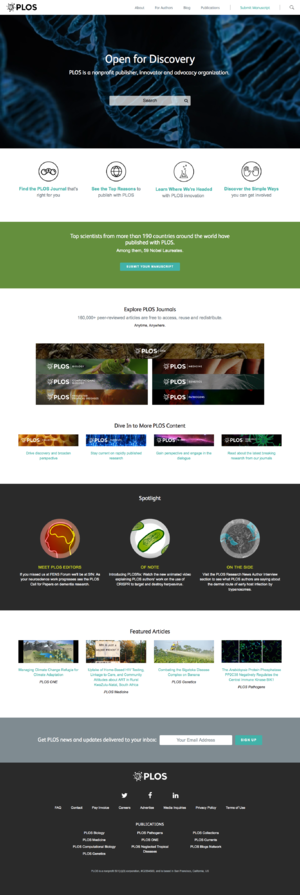PLOS Public Library Of Science
Self-portrait
Openness Inspires Innovation It's the way we think science and publishing should be.
PLOS was founded in 2001 as a nonprofit Open Access publisher, innovator and advocacy organization with a mission to accelerate progress in science and medicine by leading a transformation in research communication. Our efforts and successes have inspired others – from individual researchers to the larger publishing industry – to move toward a more open ethos.
Open is no longer just about free and unrestricted access to research, it's also about open data, transparency in peer review and an open approach to science assessment.
Open is a mindset that represents the best scientific values. One that focuses on bringing scientists together, to share work as rapidly and as widely as possible, to advance science faster and to benefit society as a whole.
Making Breakthroughs Is Habit Forming Since launching its first journal in 2003, PLOS has been a force for transformation in scholarly publishing, breaking with archaic traditions from previous generations. Our key innovations accelerate science and medicine, from research discovery to influence tracking.
(https://www.plos.org/who-we-are)
Description
PLOS is a project dedicated to the creation of a library of Open Access scientific and medical journals. It aims to accelerate the progress of science and medicine through a transformation in the circulation of research and the practice of "peer reviewing ", a mutual and rigorous evaluation of the work made by the collaborators of the platform.
The project started in October of 2000 in San Francisco, California. It was created by Patrick O. Brown, professor of the Department of Biochemistry at the University of Stanford, Harold E.Varmus, Nobel Prize-winning scientist and director of the National Cancer Institute (USA) and Michael Eisen, professor of genetics and genomic medicine at the University of California, Berkeley.
The PLOS suite is divided into several general fields: biology, computational biology, genetics, medicine, tropical diseases, pathogens and PLOS ONE, that works as a multidisciplinary journal. In addition to the organization of these general fields, PLOS contributes to the realization of twenty blogs and two community channels, involving more than 6500 academic publishers and 90,000 people between authors, readers and analysts from 200 countries.
PLOS is licensed under the Creative Commons Attribution (CC BY) which was established to facilitate access and free reuse of material of any kind. Under this license authors agree to deliver papers legally available for reuse without permission or fees, provided that the author and the original source are properly cited. PLOS has innovated in the development of applications such as ALM (Article Level Metrics) which was designed as a tool to measure the impact or influence of published research. Additionally, and in collaboration with SPARC (Scholarly Publishing and Academic Resources) and OASPA (Open Access Scholarly Publishers Association), PLOS developed the project How Open is it? Open Spectrum Access (OAS) with the aim of creating a place for the evaluation and comparison of Open Access policies posed by publishers, helping authors to make informed decisions about where to publish.
Links
URL: https://www.plos.org
Wayback Machine: https://web.archive.org/web/*/https://www.plos.org
Wikipedia: https://en.wikipedia.org/wiki/PLOS
